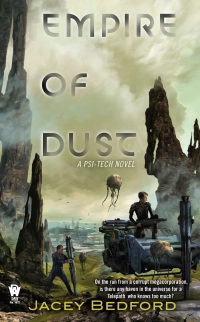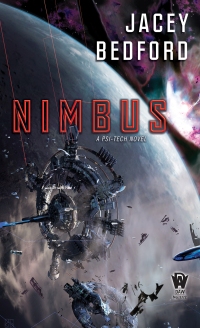My publishing process goes like this:
 The publisher offers a contract (negotiated by my agent) which may be for one, two or three books, and on signing I get half the advance. My agent takes the agreed cut and I get the rest, upfront. (Don’t get excited, it’s really not squillions of dollars.)
The publisher offers a contract (negotiated by my agent) which may be for one, two or three books, and on signing I get half the advance. My agent takes the agreed cut and I get the rest, upfront. (Don’t get excited, it’s really not squillions of dollars.)- I write the first draft (sometimes with input from my agent.)
- Depending on the publishing schedule, I sometimes get a request for cover blurb and ideas for cover art before the first draft is finished. My editor asks be to identify a couple of scenes which could be illustrated for the cover and to send (if applicable) character descriptions and an extract from the relevant scene together with significant world-building details. For my Psi-Tech series, my editor suggested illustrator Stephan Martiniere (whose work I adore) and for the Rowankind books she asked me whether there was anyone I particularly liked. I suggested Larry Rostant and she agreed—and I love the results. I get to see the actual illustrations long before I see how they are used in the final book design.
 I send the first draft to my editor.
I send the first draft to my editor.- There’s a waiting period while she reads it, so if I’ve been contracted for multiple books, this is when I start thinking about the next one. (Even if I haven’t got a new contract at that stage, it’s time to plan ahead.)
- A few weeks later I get editorial comments, usually in the form of a long and detailed phone call during which I scribble notes like mad.
- I revise: add lumps, subtract lumps, Move sections around, rewrite sections, and polish the new version. (Note revision is often structural, not just a question of polishing prose.)
- I send it to my editor. (This can be a rinse and repeat situation until she says she’s happy with it, though in most cases—so far—the revised version has been okay.)
- During any gaps while my editor is considering the work in progress, I spend more time working on the next book.
- I get to see the final cover, i.e. the illustration with added graphics, and when I get permission from the publisher I do a cover reveal on my blog, and the cover is released into the wild to settle on the advance ordering page on various bookseller websites: Amazon, Barnes and Noble etc.
 Once my editor has okayed it, the manuscript goes to the copy editor who licks the basic prose into shape–changing my British English to American spellings, and adding a ton of commas because Americans tend towards heavier comma usage than most Brits.
Once my editor has okayed it, the manuscript goes to the copy editor who licks the basic prose into shape–changing my British English to American spellings, and adding a ton of commas because Americans tend towards heavier comma usage than most Brits.- I get the manuscript back with the copy edits marked as track changes in Word, and the occasional comment on research (checking for anachronisms and historical inaccuracies).
- I can accept or reject changes. Mostly I accept the punctuation changes because the copy editor is much better at that kind of thing than I am, but sometimes a comma—though technically correct—spoils the flow of what I’ve intended the sentence to sound like, so I have to discuss it with the publisher. That happens most often when it’s in speech and it’s more about character voice than technical accuracy. Very occasionally, a comma added in the wrong place can change a meaning, so I have to reject those changes.
 Occasionally I have to re-word something because I’ve used a Britishism that my copy editor clearly doesn’t get, so it’s wrong for the American market. (Dry stone wall in Winterwood; tannoy in Crossways, and trug in Silverwolf.)
Occasionally I have to re-word something because I’ve used a Britishism that my copy editor clearly doesn’t get, so it’s wrong for the American market. (Dry stone wall in Winterwood; tannoy in Crossways, and trug in Silverwolf.)- The copy edit stage is my last chance to make any small but significant changes. No one would thank me for doing a major rewrite at this stage, of course, but this is my chance to catch any repetition or anything slightly out of order.
- So once I’ve made a few minor changes and agreed the copy edits, the manuscript goes back to my publisher. Once they confirm that no further changes are required, the book is classed as ‘delivered’, which is a good thing because this triggers the second half of the advance payment for this one book. Yay!
- The publisher prints a few ARCs – that’s Advance Reading Copies. These still have some typos in them, but they are close enough to send out to reviewers (who are used to getting the not-quite-final version).
 The next thing I’ll see are the page proofs. I usually have between three to ten days (or if I’m lucky, a couple of weeks, depending on the publisher’s schedule) to check the proofs. At this point I can only make very minor alterations – say – if I spot a typo or maybe the occasional word error. Once I’ve returned the page proofs, my part in the writing of the whole thing is done, though it still goes through another typo check at the publisher’s end before being committed to print.
The next thing I’ll see are the page proofs. I usually have between three to ten days (or if I’m lucky, a couple of weeks, depending on the publisher’s schedule) to check the proofs. At this point I can only make very minor alterations – say – if I spot a typo or maybe the occasional word error. Once I’ve returned the page proofs, my part in the writing of the whole thing is done, though it still goes through another typo check at the publisher’s end before being committed to print.
- Then the book goes through printing and distribution ready for the launch, which, for some reason, is always the first Tuesday of the month. This is now the time to step up work on that next book – but, hang on, there’s promotion for this one. I have a publicist who essentially works for PenguinRandonHouse and deals with a lot more authors besides me. She helps to organise interviews and reviews and (sometimes) guest blogs and blog tours. I also arrange some guest blogs myself (and do blogswaps with author friends). It takes a surprising amount of work to come up with ten original ideas for blog pieces, so I’m always relieved when I get interview questions.
 Publicity is ongoing after publication, but usually, well before publication day, I’m working on the first draft of the next book.
Publicity is ongoing after publication, but usually, well before publication day, I’m working on the first draft of the next book.- Before the official publication day I get a box full of author copies, promptly take some selfies with book (or maybe some shelfies) and post them on Facebook and Twitter usually with me grinning like a big grinny thing, because seeing the actual finished book for the first time is fantastic.
- Then it’s ‘book birthday.’ YAY!
- And the publicity continues with more interviews and guest blog posts.
- And then it’s time to get on with writing the next one.

Pingback: Some Random Thoughts on Revisions and Edits | Jacey Bedford
Oh, lovely. Thanks for letting me know. 🙂
LikeLike
In case you hadn’t seen this, someone mentioned your Psi-Tech books as one of their favouite space operas over at Tor.com, I think in the section on women writers of space opera, but it might have been in the general space opera one, I read both earlier and can’t remember which it was. Anyway you did good!
LikeLike